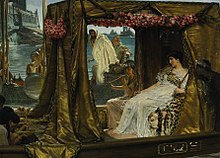Meanwhile, Antony's campaign against Parthia turned disastrous, tarnishing his image as a leader, and the mere 2,000 legionaries sent by Octavian to Antony were hardly enough to replenish his forces.
On the other hand, Cleopatra could restore his army to full strength, and since he was already engaged in a romantic affair with her, he decided to send Octavia back to Rome.
Octavian used this to spread
propaganda implying that Antony was becoming less than Roman because he rejected a legitimate Roman spouse for an "Oriental
paramour".
In 36 BC, Octavian used a political ploy to make himself look less autocratic and Antony more the villain by proclaiming that the civil wars were coming to an end, and that he would step down as triumvir if only Antony would do the same; Antony refused.
After Roman troops captured the
Kingdom of Armenia in 34 BC, Antony made his son Alexander Helios the ruler of Armenia; he also awarded the title "Queen of Kings" to Cleopatra, acts which Octavian used to convince the Roman Senate that Antony had ambitions to diminish the preeminence of Rome.
When Octavian became consul once again on 1 January 33 BC, he opened the following session in the Senate with a vehement attack on Antony's grants of titles and territories to his relatives and to his queen.
Defecting consuls and senators rushed over to the side of Antony in disbelief of the propaganda (which turned out to be true), yet so did able ministers desert Antony for Octavian in the autumn of 32 BC.
These defectors, Munatius Plancus and Marcus Titius, gave Octavian the information he needed to confirm with the Senate all the accusations he made against Antony.
By storming the sanctuary of the Vestal Virgins, Octavian forced their chief priestess to hand over Antony's secret will, which would have given away Roman-conquered territories as kingdoms for his sons to rule, alongside plans to build a tomb in
Alexandria for him and his queen to reside upon their deaths.
In late 32 BC, the Senate officially revoked Antony's powers as consul and declared war on Cleopatra's regime in Egypt.

The Battle of Actium, by Lorenzo Castro, painted 1672, National Maritime Museum, London
In early 31 BC, while Antony and Cleopatra were temporarily stationed in Greece, Octavian gained a preliminary victory when the navy under the command of Agrippa successfully ferried troops across the
Adriatic Sea.
While Agrippa cut off Antony and Cleopatra's main force from their supply routes at sea, Octavian landed on the mainland opposite the island of Corcyra (modern
Corfu) and marched south.
Trapped on land and sea, deserters of Antony's army fled to Octavian's side daily while Octavian's forces were comfortable enough to make preparations.
In a desperate attempt to break free of the
naval blockade, Antony's fleet sailed through the bay of
Actium on the western coast of Greece. It was there that Antony's fleet faced the much larger fleet of smaller, more maneuverable ships under commanders Agrippa and
Gaius Sosius in the
battle of Actium on 2 September 31 BC.
Antony and his remaining forces were only spared due to a last-ditch effort by Cleopatra's fleet that had been waiting nearby.
Octavian pursued them, and after another defeat in Alexandria on 1 August 30 BC, Antony and Cleopatra committed suicide; Antony fell on his own sword and into Cleopatra's arms, while she let a venomous snake bite her.
Having exploited his position as Caesar's heir to further his own political career, Octavian was only too well aware of the dangers in allowing another to do so and, reportedly commenting that "two Caesars are one too many", he ordered
Caesarion—Julius Caesar's son by Cleopatra—to be killed, whilst sparing Cleopatra's children by Antony, with the exception of Antony's
older son.
Octavian had previously shown little mercy to military combatants and acted in ways that had proven unpopular with the Roman people, yet he was given credit for pardoning many of his opponents after the Battle of Actium.


0 comments:
Post a Comment